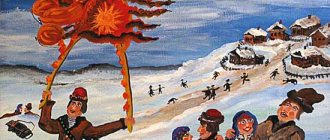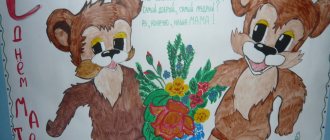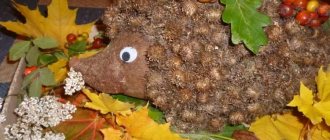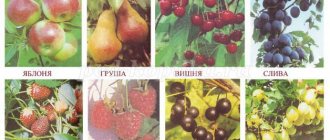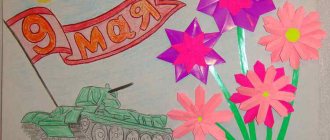2.2/5 — (788 votes)
Hi all!
If you celebrated the New Year 2022 with noise and clamor, then another holiday is approaching - the Nativity of Christ. But before that, according to tradition, from January 6 to 7, caroling takes place throughout the country. The most basic attributes of this event are dressing up, that is, dressing up and reading and singing carols and songs. There are also games and fortune telling.
Do you even know what a carol is? To be honest, I had never even thought about this question before. But now I have to, and I’m sharing the information with you. It turns out that this word means “calendars”, it’s funny, it’s a song with wishes for a good life, wealth, good health and a great harvest.
Adults and children walked around the courtyards and apartments and sang songs, and those who opened the doors in response treated them with goodies. And this mood and the resulting charge of energy lasted for a couple of months. And a lot more positive emotions. I remember when I was a child I had to perform such tunes. Yes, it was very fun and funny.
These wonderful songs have practically no authors; they were all invented by the Russian people. They are performed mainly during the Christmas period, so to speak, certain Slavic rituals are carried out.
I suggest you take all these not too long texts and memorize them with your children, and then walk around and sing them. Good luck, let's go.
Short Christmas carols for children
Do you know how to carol correctly? And another question, when? That's right, in the evening of January 6-7. But, besides this, you should know some more features, which I will tell you about right now. Read and memorize, because it is very interesting, find out who the bell ringer, the mekhonosh and the star are. And the term caroling itself means the following (I made newspaper clippings):
Now let's move on directly to the rhymes and tunes themselves, choose any one you like and enchant everyone.
***
This is how it has happened in this world For many years in a row On such a magical, good evening Angels are flying from heaven to us They bring goodness, hope, Blessings to every home I congratulate everyone on the new year and a blessed Christmas!
***
Kolyada, Kolyada Open the gates, Take out the chests, Give us the snouts. Even a ruble, Even a nickel, Let's not leave home like that! Give us some candy, or maybe a coin, don't spare anything, it's Christmas Eve!
***
Mister, gentlemen Mister, gentlemen, Mister's wife, open the doors and give us a gift! Pie, roll or something else!
***
Kolyada, Kolyada Kolyada, Kolyada, The next day of Christmas! Whoever serves the pie will have a belly yard. Whoever does not give the pie, To him the gray mare May the grave be torn apart!
***
***
Triumph, rejoice, good people with me, And with delight put on the robe of holy joy. Now God has appeared in the world - God of gods and King of kings. Not in a crown, not in purple This Heavenly Priest. He was not born in chambers and not in cleaned houses. No gold was visible there, Where He lay in swaddling clothes. Inconceivable He fit into a cramped manger, like a poor man. Why was He born? Why is it so poor? In order to deliver us from the devil’s snares, to magnify and glorify us with our love, we will forever glorify God for such a day of celebration! Let me congratulate you on Christmas Day! We wish you many summers, many, many, many years.
***
Kolyada, Kolyada, Whoever doesn’t give a pie, We take the cow by the horns, Whoever doesn’t give a crumpet, We give him a bump on the forehead, Whoever doesn’t give a penny, We’ll cut his neck on the side.
***
The carol has arrived on Christmas Eve, Give me the cow, Butterhead. And God bless the one who is in this house. Rye is thick for him, Rye is tight. He gets an octopus from an ear, a loaf of grain, a pie from half grain. The Lord would endow you with life, existence, and wealth. And create for you, Lord, even better than that!
***
Kolyada, Kolyada Open the gates, Take out the chests, Give us the snouts. Even a ruble, Even a nickel, Let's not leave home like that! Give us some candy, or maybe a coin, don't spare anything, it's Christmas Eve!
***
***
The little sparrow flies, twirls his tail, And you, people, know, Cover the tables, Receive guests, Celebrate Christmas!
***
Congratulations people! The day of general fun has arrived! Short, medium, long, Young, young, old! We bring congratulations to everyone, We are looking forward to a treat for this!
***
I help my mother. I carol until the morning. Have pity baby, give me some candy!
***
Joy without boundaries has arrived, Let's celebrate in the morning! We wish you health, Lord, for many years to come! We sow, we sow in your house, we are waiting for a cup of treats!
***
As Christ's Nativity Rolled under the window, Nikanorov's yard On seven pillars. The pillars are turned, gilded. Our carol is neither small nor large. He sews under the window and serves pies. Here in the master's house
***
Do you know that the most famous carol is Carol Of The Bells and, apparently, as I understand it, it has a Ukrainian origin.
This song is a ritual song and is sung at Christmas.
Keep the processed and finished composition from composer Nikolai Leontovich. And by the way, on January 13, the so-called Vasiliev's evening, which is called Generous, is celebrated. On this day you can also chant:
Shchedrik, Shchedrik, Shchedrovochka, A swallow has flown in. She began to chirp to herself and call the owner: “Come out, come out, owner, Look at the shed - The sheep lambed there, And the lambs were born. Your goods are all good, You will have more than a penny, Even if it’s not money, it’s chaff.” Your wife has black eyebrows. Shchedrik, Shchedrik, Shchedrovochka, A swallow has flown in.
Or here’s another tune that can be performed by groups in your city or village.
On a starry night Christ was born. He was laid in a simple manger. An angel descended from heaven into the field, He announced the news to the shepherds: “Rejoice, everyone - Christ has been born. He was laid in a simple manger.” Glory, glory, glory to God in the highest! Goodwill to all people! The angelic choir sang a song, proclaimed peace on earth.
Here are more carols for the Christmas holiday:
The night is quiet, the night is holy, People are sleeping, the distance is clear; Only in the stable the light is on; There the holy couple does not sleep, The Child slumbers in the manger.
The Child is dozing in the manger. The night is quiet, the night is holy, the heights are illuminated, a bright angel from heaven brings the news to the shepherds: “Christ has been born to you!” Christ was born to you!”
The night is quiet, the night is holy, A star is burning in the sky; The shepherds have been on the road for a long time, They are in a hurry to come to Bethlehem: There they will see Christ. They will see Christ there.
The night is quiet, the night is holy, All hearts await happiness. God, let me come to Christ and find bright joy in him. Glory forever, Christ! Glory forever, Christ!
***
***
Merry carol Kolyada, carol... And the woman has a beard. And my grandfather grew a tail. The scoundrel is running around in the garden.
Kolyada, Kolyada... It doesn’t matter to us. God will give you full health. The bins will be full.
Kolyada, Kolyada... We dance all the years. And on all fours we boldly climb the steps.
Kolyada, Kolyada... It's nothing like cold. I’m healthy, I’ll go in the cold, I’ll swim in the pond.
Kolyada, Kolyada... Have fun, people, always! After all, it’s not fitting for us to be sad, Enjoying the little things in life.
Kolyada, Kolyada... There is a candle and food on the table. The cute Christmas tree is shining. The Lord blesses everyone.
***
I'm caroling, caroling, I'll go into any hut. I’ll ask the hostess: “Give me some goodies!” And cookies, and sweets, And sherbet with nuts, Pastille and marmalade - I will be glad to see all the gifts. I will treat everyone and praise the hostess!
***
***
I’ll go into any house and there I’ll sing carols! There will be day and there will be night, All sorrows will go away! Happiness to everyone, health to you, We are waiting for a hundred grams of candy!
***
We sing carols, we sing carols, we alternate songs and dances! And squat down, and around, Treat me to a pie!
***
Well, good hostess, quickly give us some sweets! We bring happiness and joy into the house, We are still waiting for pies! There will be day and there will be food, Kolyada will not forget you!
***
Kolyada, Kolyada, Whoever doesn’t give a pie, We take the cow by the horns, Whoever doesn’t give a crumpet, We give him a bump on the forehead, Whoever doesn’t give a penny, We’ll cut his neck on the side.
***
Let us congratulate you in verse, friends, I came to you to sing carols! Women make pies, piping hot, out of the oven! And sweets to boot, for good luck, for good luck!
***
Kolyada, you are my Kolyada! Open the gates quickly! Today I bring happiness to your home, Give me sweets, friends!
***
Give us coins, Give the children some candy, We don’t bring harm to people. We cannot be denied!
***
***
Kolyada, you are my Kolyada! Happy holiday to everyone! The pies on the tables are glowing with heat, Everyone hears congratulations from me!
***
Koleda - moleda, White beard, Nose - a bowl, Head - a basket, Hands - sabers, Legs - rakes, Come on New Year's Eve, Call honorable people!
***
Open the doors wider and hand out candy! There's a carol on the doorstep, come running here, everyone! We wish you good health, and we'll take away the sweets!
***
Joy and happiness come to the house, After the New Year's nights, Christmas is coming, The kids go caroling! He reads short poems. He congratulates everyone from the bottom of his heart! Waiting for cookies and sweets, Greetings from your family!
***
A star is shining in the sky, Kolyada comes to the house! Children go home, Prepare a hundred grams of sweets! If you don’t pamper your children, you’ll definitely feel sad these days!
***
So that there is in the bins, So that there is happiness in the homes. Get out your treats, May luck be with you! We are the messengers of the holy day, We wish you loving peace!
***
***
Kolyada comes to visit, throw away all your affairs! There will be joy, there will be a feast. There will be peace in every home!
***
So that the rye is thick, so that the butter does not melt, so that there is money, so that the guys are well-fed! You need to treat us, We came to carol!
***
I’m called a fur-bearer, and I’m not afraid of frost! I’m coming to your light, And I’m carrying a big bag!
***
Mother winter has come. Open the gates! Christmas time has come! The carols have arrived! Kolyada-molyada!
***
Kolyada, Kolyada! Give us a pie, Or a loaf of bread, Or half a ruble of money, Or a chicken with a crest, A cockerel with a comb!
***
They sowed everything, scattered it everywhere, and covered you with well-fed grain! They came to you to sing carols. Happiness. A joy to offer! And in return we want sweets, so that we too have a lot of joy!
***
Merry Christmas to you, people! May you have peace and harmony, So that you do not know grief And remain in wealth!
***
Kolyada, Kolyada! And there is a carol. On Christmas Eve, Kolyada came and brought Christmas.
***
***
Kolyada comes - it's a fairy tale Happiness, snow, skates, sleds! Lights on the Christmas tree and children's laughter! And general joy for everyone! And now for our congratulations, we are entitled to sweets and cookies!
***
Christ the Savior was born at midnight. He settled in a poor den. Here the Star shines above the nativity scene. Christ the Master, on Your birthday, Grant peace of enlightenment to all people!
***
And God bless the one who is in this house! The rye is thick for him, the rye of a supper! He has an octopus from an ear, a loaf of grain from a grain, a pie from half a grain. The Lord would endow you with life, existence, and wealth!
***
We sow, we blow, we spread, Merry Christmas! Glorify Christ, give us treats!
***
Give you, Lord, On the field of nature, On the threshing floor, There is thick kneading, On the table there is sporin, There is thicker sour cream, The cows have been milked!
***
An angel descended from heaven to you and said: “Christ was born!” We came to glorify Christ and congratulate you on the holiday.
***
We're going to sing carols, Let's congratulate everyone! Read short poems and receive candy!
***
Kolyada arrived on Christmas Eve. May God bless whoever is in this house, We wish all people well. Gold, silver, Fluffy pies, Soft pancakes. Good health, Cow Butter.
***
***
Kolyada, Kolyada, Kolyada! The breadth of radiant smiles! This is joy, this is children's laughter, empty your pockets for everyone! We wish you happiness, We look forward to treating you!
***
Good evening to good people! Let the holiday be merry. Merry Christmas to you. We wish you happiness and joy! Generous evening, good evening! Good health to good people!
When is the holiday of Kolyada celebrated?
Kolyada is a holiday of the Slavs, the date on which Christmastide began (December 25 - the day of the winter solstice), and they continued until January 6. Thus, even before the adoption of Christianity, people performed Kolyada rituals praising the god of heaven - Dazhdbog.
On what date was the holiday Kolyada celebrated after the adoption of Christianity? Pagan celebrations merged with the birthday of Jesus Christ, and Christmastide was already celebrated from December 6 to 19, that is, from Christmas to Epiphany. These Christmas traditions continue to this day.
Carols with notes and words
To make it fun and loud, it’s better, of course, to carol with songs and music. Therefore, choose the appropriate text, notes are given below it. And of course, you need to prepare for such an event in advance, remember this. Memorize it the day before.
“A carol has come” Russian folk song. The carol arrived on the eve of Christmas. We walked, we looked for the holy carol. We found a carol at Romanov's yard. Romanov Dvor, Iron Tyn. In the middle of the courtyard there are three towers. In the first chamber there is a red sun, The red sun is the hostess. In the second chamber - the month is bright, in the third chamber - stars are frequent. The month is getting light - then the owner is here. Often the stars are small.
"Carol" Russian folk song. 1. The carol was born on Christmas Eve. Chorus: Oh, carol, my carol! 2. Open the window, start Christmas! 3. Open doors, get out of bed.
Christmas carols"
Music by A. Shidlovskaya. Folk words. 1. Like the frost outside Freezes your nose, Doesn’t tell you to stand for long, Tells you to serve it soon! 2. Or a warm pie, Or butter, cottage cheese, Or money with a spear, Or a silver ruble.
"Carol" Russian folk song. Oh, Kolyadka, Kolyada, Golden Head! Kolyada came - she brought good things to you all!
"Carol" Russian folk song. Kolyada-malyada, Rolled up young. We were looking for carols in Ivan's yard. Like the frost on the street Freezes your nose, Does not order you to stand for long, Orders you to serve quickly: Or a warm pie, Or butter-cottage cheese, Or money with a spear, Or a silver ruble.
Calendar song “Go Carol” Russian folk song.
1. The carol went from end to end, Ay, carol, carol, my carol! 2. A carol came into Marya’s yard, Ay, carol, carol, my carol! 3. And Maryushka, our sweetheart, Ay, carol, carol, my carol! 4. The carol has arrived, open the gates, Ay, carol, carol, my carol!
The essence of the holiday
Kolyada is a holiday of the Slavs, the popular name for Christmas and Christmastide, which continues today from January 7 to January 19 (Epiphany).
The main purpose of Kolyada is to conduct rituals dedicated to Christmas Eve. The main traditions that have been preserved to one degree or another in our time are:
– dressing in various outfits, in particular those made from animal skins and horns, using masks;
- caroling, singing carol songs;
– thanking the carolers and giving them sweets, food, coins and other things;
– games of young people;
- fortune telling for unmarried girls.
Kolyada is a holiday that has been the largest and most important in winter since the times of the pagans, just as now the Nativity of Christ is for all Christians.
Place of fortune telling on the holidays of Kolyada
Fortune telling on the holidays of Kolyada occupied a special place; they were usually carried out from the evening before the Nativity of Christ until January 14 (New Year according to the old style). It was believed that it was on these days that girls could find out their fate and reveal the secret of the future, see the groom and even predict the wedding date. There were many rituals. The most popular of them are the following:
1. The girl had to go out into the yard and throw the boot from her left foot over the fence. Then watch him fall. If the toe is towards the house, then she will not get married this year, if in the opposite direction, then they looked in which direction the boot was pointing - they say, that’s where you should wait for your betrothed.
2. Take 2 needles, smear them with fat or lard and lower them into water. If they sank immediately, then the year was foreshadowed to be unsuccessful, but if they remained afloat, and even got together, then it was worth waiting for a rich year and a quick marriage.
3. They also used the log to tell fortunes. A young girl from the woodshed blindly pulled out one stump and examined it carefully. If it was rough, then the betrothed will have an unsightly appearance; if it is smooth and even, then the future husband will be handsome and stately. Many knots on the stump indicated that the guy would be from a family with many sisters and brothers. If you come across a crooked and twisted log, then the groom will have external defects (crooked, pockmarked, etc.)
4. Fortune telling with rings. It consisted in the fact that any cereal or rye, wheat was poured into a sieve, 4 types of rings were also placed here: metal, silver, with a stone and gold, and they mixed it all well. For this fortune-telling, a company of unmarried girls gathered, each of whom scooped up one handful of the contents:
- if only grain came across, then this year the girl will not get married at all;
– if it’s a simple metal ring, then she will marry a poor guy;
– if the ring is silver, then the groom will be simple;
– a ring with a stone predicted family life with a boyar;
– a gold ring is a sign that the girl will marry a merchant.
5. There is also a fortune telling for which you need to take a bowl and fill it with grain, prepare pieces of paper, on one of which write the cherished name of your betrothed, and leave the rest empty. Take handfuls of grain and see how many times you get the desired leaf:
– if from the first, then the girl should expect quick matchmaking;
- from the second - it means you will have to face some difficulties;
- from the third - the young man is deceiving you, it is better not to believe his words;
- from the fourth - the guy is completely indifferent to you.
Young girls also wondered:
- at midnight in the bathhouse;
- with a mirror, expecting to see the betrothed in it;
- on water and candles.
One of the main traditions was wheel rolling. To do this, a large wooden circle in the shape of a wheel was set on fire and rolled uphill and downhill. Here you can clearly see the connection between Slavic traditions and Kolyada rituals, because the burning wheel, of course, symbolized the sun, and by rolling it uphill, it helped increase daylight hours.
Pagan roots of the holiday
So, what is Kolyada? The essence of the holiday comes down to the following: this is a list of ancient Slavic rituals that glorify and praise the pagan god of the young sun. According to many sources, Kolyada was also the god of merry feasts.
The main version of the origin of the holiday is that the luminary was praised on the day of the winter solstice. There was even a legend about this. The serpent Korotun devoured the Sun, and the goddess Kolyada helped people and gave birth to a new, young luminary - Bozhich. People try to help the goddess and protect the newborn from the snake by singing and shouting loudly, dressing in scary costumes made of animal skins and using horns. Young people walk around all the yards with carols to announce that a new young sun has been born.
After the adoption of Christianity, the church in every possible way prohibited the customs of caroling and the worship of gods, but it was not possible to completely eradicate ancient traditions and rituals. Therefore, clergy and believers began to walk around the courtyards, announcing that Jesus Christ was born and praising him. These customs have survived to this day. Although the owners often did not give gifts to such carol performers, on the contrary, they tried to avoid them. In Polesie, believing carolers were not allowed into the house, since it was believed that millet would not be productive, and those who caroled according to the old custom were generously rewarded and thanked.
History of caroling
Carols were usually sung not in the house, but right under the windows. Young girls asked permission to enter and then sang “grapes,” widespread in the North. Here carolers were presented not with pies or sweets, but with ritual cookies in the shape of animals and birds. Such shortcakes were made from long-lasting dough; they were valuable and expensive for every family, because they were stored throughout the year so that household utensils would not get lost on the way home and multiply. Such cookies were made before, but with images of symbols that were addressed to the gods (the sign of the Family or the Sun).
The ritual of caroling was carried out throughout the week, starting on December 25 (Christmas according to the Julian calendar). The main attributes of such a procession were:
1. Star. They made it from strong paper - large, about an arshin in size (about 0.7 meters) - and lit it with a candle. The star was eight-pointed, painted in bright colors.
2. Nativity scene. It was made from a box with two tiers, which contained wooden figures depicting the story of the birth of Jesus Christ.
Under the windows, carolers sang short prayer chants, and only one of the group, with the permission of the owner, could enter the house and receive treats and small money.
Kolyada is a holiday during which in large villages of Russia 5-10 groups with a star could visit one yard, and the owners tried to generously gift each of them.
How has Kolyada been celebrated since ancient times?
Most ethnographers agree that even in pre-Christian times there was such a custom as Kolyada. The history of the holiday is interesting and fascinating; many traditions and rituals have survived to this day, but some have lost force and have been changed.
Celebrations and rituals of Kolyada were carried out in the following order:
1. The first part of the celebration was that a large number of people came to pagan temples (temples) to perform the ritual of sacrifice and communicate with the gods, to become closer to them.
As the legends say, people gathered near rivers, in forests, near fire and thanked and praised their gods, asked for repentance and future blessings. Their faces were painted, they wore masks, they wore skins and other outfits, they held spears, shields and animal horns in their hands, they made sacrifices and told fortunes.
For the ritual of sacrifice and fortune telling, a sorcerer was needed - a person who provided communication with the gods. In the family, this role was performed by the eldest man. Before fortune-telling, sacrifices of birds or animals were usually performed. In this case, the blood was poured and sprinkled around to ward off evil spirits. Parts of the animal not intended for food were buried in the ground, burned in a fire, or drowned in a river.
The elders killed the domestic animal, making requests to the gods. At this time, young girls and boys both told fortunes and sang carols that praised Kolyada, the god of the young Sun.
2. The second part of Kolyada was dedicated to the general meal. People ate the food that was sacrificed and drank in turns from a cup that was passed around. At the same time, carols were sung, the gods Navi and Prav were praised and asked for help for good people.
3. In the third part of the celebration there were so-called “games”: people performed various songs and danced to Slavic folk instruments.
The holiday of Kolyada (Solstice) had its own customs and characteristics on the next day:
“At first, several children went to caroling. They took with them 2 pies, which they divided equally among everyone and ate them after singing carols.
– Afterwards, young girls (future brides) walked and sang ritual songs. They were given several rolls and gingerbread cookies for everyone.
- At the end, all the women and men go to carol, they were also given rolls and gingerbread.
How did you prepare for the holiday of Kolyada?
Kolyada is a holiday that was the largest and most important for the people. Based on this, it can be argued that they prepared for it in advance and carefully. Ordinary people (even from the poorest families):
– they prepared a large number of dishes, in particular with meat, and for this purpose they stabbed a pig;
– cleaned the entire house thoroughly;
– steamed well in the bathhouse;
– prepared new outfits, in particular for caroling.
One thing has remained unchanged: both since ancient times and now we strive to celebrate the New Year holidays cleansed both physically and spiritually.
Interpretation of the name of the holiday
Kolyada is a pagan holiday, and its name goes back to ancient times.
One of the versions of the origin of the word “Kolyada” insists that it came from “kolo” - “sun”. It protected people from darkness, and on December 25, a new and young luminary was born, which helped increase daylight and decrease night.
Dmitry Shchepkin had a different opinion, and it is that the word “Kolyada” means “circular food or circular dishes”, “going around”. This can be explained by the fact that companies of carolers walked around all the courtyards with nativity scenes, danced and sang carols, they were rewarded for this with gifts, and afterward they all ate the food they caroled together.
In addition, there are opinions that “Kolyada” comes from the words:
– “deck” – a lit stump;
– “kolo” – round, wheel;
- from the Latin word “calenda”, i.e. “first day of the month.”
In the etymological dictionary, the meaning of the word is explained as “a custom that is associated with the beginning of the year,” which is typical for pre-Christian times, and after the adoption of Christianity, the Slavic holiday Kolyada was attached to the birthday of Jesus Christ.
According to the ethnolinguistic dictionary (Slavic antiquities), the word has pagan roots. And Strakhov claims that in Kolyada there is nothing proto-Slavic or pagan at all, and this term was adopted as an expression of the clergy (literally: “gifts or offerings that were collected by the clergy” or “content for the New Year”).
